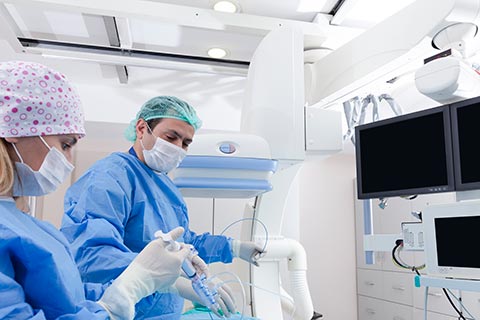Vascular Interventional Radiography (VIR)

Quick Facts
- Pathway: Health Science
- Campus: Trinity River Campus East
Vascular interventional radiography (VIR) is a specialty within radiology that uses advanced technology for minimally invasive, image-guided vascular procedures.
Explore on This Page
Job Titles & Career Info
Our Program
Why Choose VIR?
- Work with both patients & health professionals
- Use advanced medical equipment for minimally invasive procedures, so patients can avoid surgery
- Work in a fast-paced, continuously developing medical field
Prepare for What You Will Do at Work
- Assist physicians with procedures, such as:
- Vascular line placement
- Angioplasty
- Stenting
- Thrombosis
- Explain procedures to patients & ease their anxiety
- Use sophisticated fluoroscopic equipment, which uses x-rays to observe internal body structures
- Observe radiation protection measures for the safety of patients and staff
Explore Professional Organizations
- The American Registry of Radiologic Technologists (ARRT)
- American Society of Radiologic Technologists (ASRT)
Marketable Skills You Will Learn
- Critical thinking
- Reasoning
- Communication
- Personal & social responsibility
- Teamwork
- Computer literacy
Before You Enroll, Think About:
Selective Admission
VIR is a selective admission program.
After being accepted to TCC, you must meet the selective admission requirements to be eligible to submit a separate application to our VIR program.
Get the Details on These Pages:
Licensing Notice: Texas House Bill 1508
This program prepares you for an occupational license. However, you may not be eligible for licensing if you have a prior criminal history.
For more details, see Texas House Bill 1508 Licensing Requirements
Are you currently a VIR technologist who can log procedures on your own?
Choose Prior Learning Assessment (PLA): Credit-by-Experience
This option allows you to:
- Count your procedures while working
- Prepare for the registry
- Earn your Certificate of Completion
If you have a minimum of 6 months in your current employment in interventional radiology (IR) and have 25% of procedures completed, you will receive PLA credit-by-experience and will be given advanced acceptance into the program.
You will take only the didactic courses (15 semester credit hours) to help you pass the American Registry of Radiologic Technologists® (ARRT) national registry exam.
For details and costs speak with the program director.
Need a boost to get ready for college?
Talk to your advisor about Developmental Studies if your TSI scores say you need some help in math or reading and writing.
Degrees & Certificates
Advanced Technical Certificate
Attend an Information Session
About the Session
Find out everything you need to know about our program: requirements, courses, costs, and more.
Attending an information session is an application requirement. You will submit your Certificate of Attendance with your application.
Until We Can Host In-Person Sessions
Review the presentation slides and contact us if you have any questions: Vascular Interventional Radiography (VIR) Information Session (PDF)Listen
Questions?
Health Care Professions Advising Resource Hub
Kimberlyn Moore-Debrossard, Career Advisor
Call 817-515-1484
Email TR.HealthCareAdvising@tccd.edu
How Much Time & Money to Finish?
2024–2025 Academic Year
| Degree or Certificate | Program Title | Semester Credit Hours | Total Tuition & Fees |
|---|---|---|---|
| CAT | Vascular Interventional Radiography | 23 | $1,702 |
Notes:
- Tuition is based on in-state, in-county rates.
- Totals do not include textbooks and other materials.
Continuing Education Programs
Time commitments and fees vary depending on the course.
Earn More Choices & More Money
Transfer to a college or university to continue your studies. Earning a bachelor’s degree opens the door to career and promotion opportunities.
Next steps
- Talk to your advisor about planning for transfer
- Explore transfer schools
Start on Your Pathway!
Contact
Trinity River Campus East
Denise Glenn, BSRS R.T. (R)(CI)(VI) ARRT
Program Director
Call 817-515-2413
Email denise.glenn@tccd.edu
Trinity River Campus
Health Care Professions
Advising Resource Hub
Kimberlyn Moore-Debrossard
Career Advisor
Call 817-515-1484
Email TR.HealthCareAdvising@tccd.edu
Advising by Appointment
Fall & Spring Hours
Monday–Friday: 8 a.m.–5 p.m.
Summer Hours
Monday–Thursday: 7:30 a.m.–6 p.m.
Updated November 05, 2024
